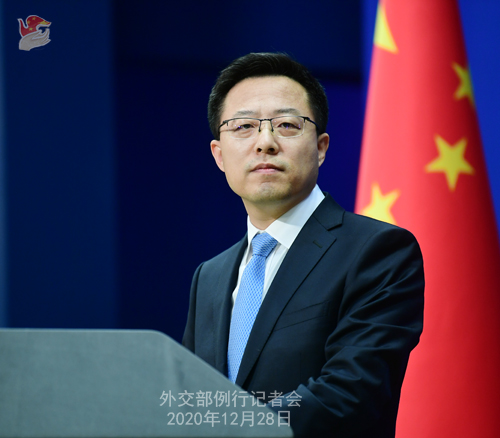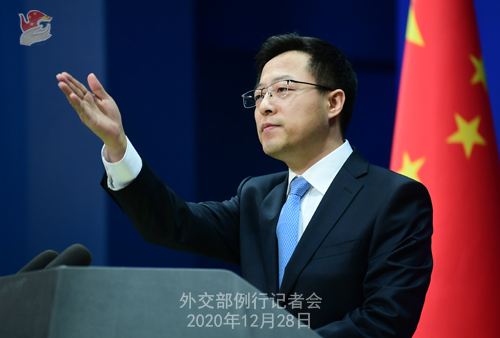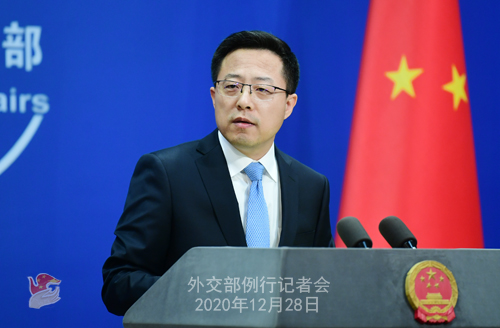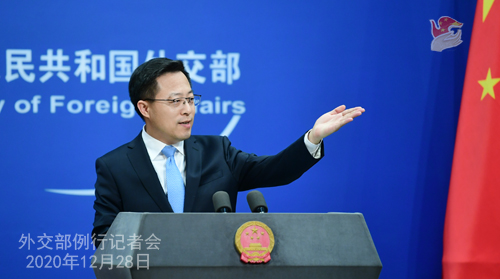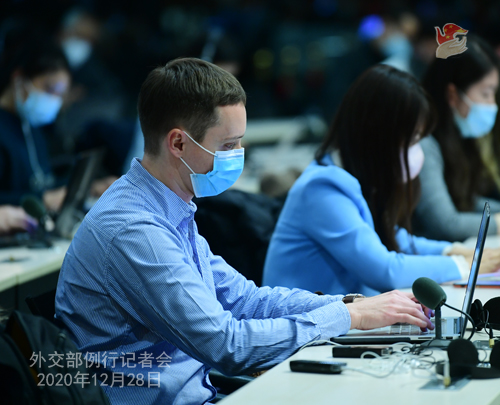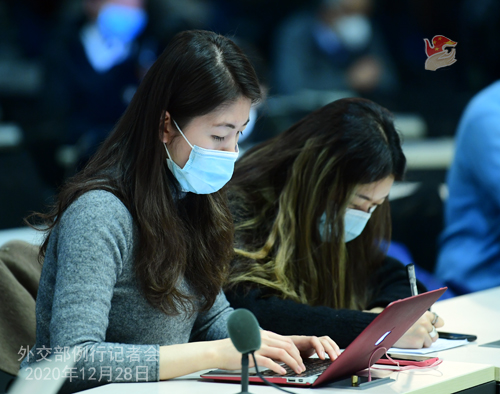| Foreign Ministry Spokesperson Zhao Lijian's Regular Press Conference on December 28, 2020 |
| 2020-12-28 21:05 |
|
AFP: The U.S. embassy in Beijing called on China to release the 12 Hong Kongers suspected of illegal border crossing. Could you comment on this? Zhao Lijian: The People's Procuratorate of Yantian District in Shenzhen has released a notice on the case. The relevant personnel are facing trial as they are suspected of illegal border crossing or organizing an illegal border crossing. The case is now in the process of trial. China firmly rejects the U.S. side's fact-distorting comments. China is a country under the rule of law, where laws must be followed and lawbreakers must be brought to justice. We urge the U.S. side to earnestly observe international law and basic norms governing international relations, and immediately stop interfering in China's internal affairs and judicial sovereignty under the pretext of Hong Kong-related issues. CCTV: It is estimated that of the 12 billion vaccine doses to be produced globally next year, the wealthy countries have booked 9 billion doses. For most countries that haven't got any vaccines, Chinese-made vaccines may be their only choice. However, people are questioning whether Chinese vaccines are reliable, citing opaqueness in clinical trial data and problems in manufacturing and supply chains. Do you have any comment on this? Zhao Lijian: The State Council inter-agency task force has held multiple press conferences on the specific details including the R&D and manufacturing capacity of Chinese vaccine candidates. I'd like to stress that the Chinese government attaches high importance to the safety and efficacy of COVID-19 vaccines. Chinese vaccine companies have been advancing R&D based on science and regulations and carrying out international cooperation following international norms, laws and regulations. Multiple Chinese vaccine candidates are under phase III clinical trials in many countries, and the trials are going smoothly. China has approved the domestic emergency use of vaccines, and there hasn't been any severe adverse reaction so far. Authoritative studies also show that Chinese-made vaccines can be more easily stored and delivered via the current cold-chain system, indicating greater accessibility without extra delivery cost. It has been China's solemn, consistent commitment that once developed and deployed, our vaccines will be made global public goods and supplied to the world with fair, reasonable prices, contributing to the accessibility and affordability of vaccines in developing countries. We will also actively considering providing vaccines to developing countries through many means, including donation and assistance. On international vaccine cooperation, the international community should pursue a win-win spirit, reject the zero-sum game mindset, and jointly oppose selfish behaviors like hoarding, monopoly, and "vaccine nationalism" in particular. China is ready to join hands with all countries in cooperation to develop more vaccines that are safe and effective, and contribute to the accessibility and affordability of vaccines. Prasar Bharati: First, China was in talks with WHO regarding the certification of its vaccines as per reports in October. So is there any progress on that regarding the certification of Chinese vaccines? Second, when is China planning to release any data on its vaccine candidates which are already in phase III clinical trials in certain countries? Zhao Lijian: On your first question, I have no further information for you at the moment. On your second question, like I said earlier, multiple Chinese vaccine candidates are under phase III clinical trials in many countries, and the trials are going smoothly.
CRI: The 6th Chinese peacekeeping infantry battalion to South Sudan (Juba) has set off home after successfully completing the peacekeeping mission and handing over mission to the rotating battalion. Do you have more details for us? Zhao Lijian: Congratulations to the 6th Chinese peacekeeping infantry battalion and welcome home! The 6th Chinese peacekeeping infantry battalion to South Sudan was deployed to the mission area last November. The battalion has completed more than 20 tasks entrusted by the UNMISS, including the protection of civilians, humanitarian relief, and observation and vigilance, and handled over 280 emergencies. They have won high praise from the UNMISS and local people. This year is the 30th year since China's armed forces first participated in UN peacekeeping operations (UNPKOs). Over the past 30 years, China's armed forces have sent over 40,000 peacekeepers to 26 UN peacekeeping missions, making China the largest troop-contributing country (TCC) among the permanent members of the UN Security Council. Our peacekeepers have braved danger to bring peace and hope to war-afflicted areas and people. China will continue to honor our pledges and always defend world peace, contribute to global development and safeguard international order. Global Times: According to Indian media, China appears to be backing away from its initial financial promises to Pakistan under the China-Pakistan Economic Corridor (CPEC). Do you have a response to that? Zhao Lijian: Such reports are groundless. As an important pilot project of the BRI, CPEC has maintained positive momentum of development since its inception in 2013. Amid the COVID-19 epidemic, there is no stop of the construction, no job cut and no withdrawal of workforce of the CPEC projects, which effectively supports Pakistan in fighting the epidemic and stabilizing the economy. These are facts that my colleagues and I shared with you on several occasions. The second meeting of the CPEC Joint Working Group on International Cooperation and Coordination (JWG-ICC) between China and Pakistan was held last Friday in Xinjiang. Both sides reiterated their commitment to implementing the consensus of leaders, giving priority to industry, agriculture, science and technology and livelihood and extending to underdeveloped areas, in a bid to build CPEC into a demonstration project of quality BRI cooperation. Meetings of other working groups were also held in preparation for the Joint Cooperation Committee (JCC) meeting of CPEC. The two sides are firmly determined in advancing CPEC that enjoys a bright prospect. I want to stress that China's input in the BRI, including CPEC, has increased despite global economic recession. In the first three quarters this year, China's direct investment in non-financial sectors in BRI partner countries grew by around 30% year on year. China has provided as much support and assistance as possible to help many BRI partners combat COVID-19 and recover economy. Prasar Bharati: A follow-up on the question regarding the CPEC. There were certain reports in Pakistani media which, citing some Pakistani officials, suggested that China is seeking additional promises from the Pakistani government on CPEC loan guarantee. I wonder if you have any comment? Zhao Lijian: These reports are simply baseless.
Beijing Youth Daily: It is reported that the total amount of foreign investment to China is expected to reach at least USD$690 billion for the period of the 13th Five Year Plan, USD$60 billion higher than the 12th Five Year Plan period. China is also one of the few major economies to achieve positive growth in inbound foreign investment, and it is expected that China's paid-in foreign investment in 2020 will hit a historic high of over USD$140 billion. What's your comment on this? Zhao Lijian: These data clearly show that the dividends of China's continuous policy of opening up are being released at an accelerated rate, and the positive effects are being felt around the world. China has been and will always be a sought-after destination for investors all over the world. According to a recent briefing by the competent departments, from 2017 to 2020, China has been shortening the negative lists for foreign investment for four consecutive years, and the latest National Negative List and FTZ Negative List have cut the item numbers to 33 and 30 respectively. Major opening up measures for foreign investment have been taken in sectors like manufacturing, energy and resources, infrastructure, agriculture and finance. China's practices on opening up prove that we act on our words. At present, China is speeding up the fostering of a new dual-circulation development paradigm. Foreign businesses, as a significant part of both the domestic and the international circulation, is welcome to play an important role in accelerating the formation of the new development paradigm, seize opportunities as China opens wider to the outside world, and achieve greater success with win-win results. Kyodo News: The Tibetan Policy and Support Act signed into law by the US President touched on the issue of the succession of the Dalai Lama. How does China decide on the reincarnation and the future Dalai Lama? And what is China's comment on the U.S. signing into law of the relevant Act? Zhao Lijian: Since you asked about the reincarnation of the Dalai Lama, I would like to reiterate China's position. Reincarnation of living Buddhas, as a unique institution of inheritance in Tibetan Buddhism, comes with a set range of rituals and conventions. The Chinese government implements the policy of freedom of religious belief. The reincarnation system is respected and protected by such legal instruments as Regulations on Religious Affairs and Measures on the Management of the Reincarnation of Living Buddhas. The institution of reincarnation of the Dalai Lama has been in existence for several hundred years. The 14th Dalai Lama himself was found and recognized following religious rituals and historical conventions, and his succession was approved by the then central government. Therefore, reincarnation of living Buddhas including the Dalai Lama must comply with Chinese laws and regulations and follow religious rituals and historical conventions. China firmly opposes the U.S. Act on Tibet that you asked about. Tibet-related issues, as part of China's internal affairs, bear on China's sovereignty and territorial integrity and allow no interference by any external forces. The Chinese government is determined to safeguard its sovereignty, security and development interests. We urge the U.S. side to stop exploiting relevant issues to interfere in China's internal affairs, and take no actions to implement articles in the Act that target China and hurt China's interests, so as to avoid further damaging China-US cooperation and long-term development of bilateral relationship.
China Daily: The U.S. embassy in China has recently retweeted many U.S. Department of State posts to attack the CPC's Xinjiang policy, and said over one million Uyghur Muslims were put in "detention camps". Do you have any response to this? Zhao Lijian: The U.S. diplomatic authorities, led by several anti-China politicians, have been neglecting truth, making fabrications, and time and again spreading disinformation about Xinjiang. China firmly opposes and strongly condemns this. I'd like to stress the following points. First, the disinformation on Xinjiang fabricated by some American politicians is the biggest "lie of the century". Journalists from about 20 major foreign media agencies attended the Xinjiang-related press conference held in Beijing by the government of Xinjiang Uyghur Autonomous Region. Government officials, religious personnel, graduates of vocational education and training centers, and migrant workers talked about the real situation in Xinjiang based on their own experiences. If certain American politicians and officials truly want to know more about the true Xinjiang, they should read from beginning to end the transcript of this press conference instead of citing reports made by anti-China forces to disseminate disinformation and mislead the international community. Second, Xinjiang enjoys social stability, economic growth, ethnic solidarity, harmony among religions and better livelihoods, and people of all ethnic groups including Uyghurs are living a life of happiness, tranquility and peace. By contrast, there's systemic racial discrimination and police brutality in the U.S. judicial and law enforcement systems. Polls show 75 percent of American Muslims believe there's serious discrimination against Muslims in the American society. Since the pandemic broke out, according to official statistics published by the U.S. side, in Florida alone there have been more than one million people applying for unemployment benefits. Numbers don't lie! Third, the U.S. diplomatic missions in China should fulfill their duty of promoting bilateral relations and friendship instead of spreading disinformation, attacking and smearing China. Statistics show that in December alone, the U.S. diplomatic missions in China published over 60 pieces of false information on China, including articles slandering the CPC and China's political system, triggering repulsion and indignation from the Chinese people. The right to life and health is the most important human rights. The U.S. government should earnestly reflect upon it, stop spreading the political virus or interfering in China's internal affairs under the pretext of Xinjiang, focus on resolving domestic problems, and take concrete actions to protect American lives and safeguard the human rights of American people including the ethnic minorities. Phoenix TV: In an annual report published on December 26, the UK-based Center for Economics and Business Research (CEBR) made positive comments and projections of China's management of the pandemic, economic recovery and development prospects. Do you have any comment on this? Zhao Lijian: Amid the global pandemic this year, the Chinese government has always put people and life front and center, taken the most comprehensive, rigorous and thorough epidemic prevention and control measures and given full play to our unique advantage in mobilizing resources to accomplish major, challenging and emergent tasks. In the battle against the virus, the 1.4 billion Chinese people have demonstrated the great spirit of putting people's lives first, nationwide solidarity, sacrifice, respecting science and a sense of mission for humanity. Although the epidemic is already brought under control in China, the Chinese people keep wearing masks in public places out of a high sense of responsibility and self-discipline. As China was among the first to have brought the epidemic under control and to have resumed work and production, China becomes one of the leading countries in realizing steady economic recovery and is expected to be the only major economy to achieve positive economic growth this year. I want to stress that China's economic growth aims to meet the Chinese people's aspiration for a better life and inject impetus into global economic recovery. China is still the biggest developing country in the world, where uneven and inadequate development remains a prominent problem. Development is the underpinning force for tackling all challenges. As we work to develop a new development paradigm for high quality development, China will play a more active role in global market, deepen cooperation with other countries, and share development opportunities for win-win results.
Reuters: Besides the Tibetan Policy and Support Act, the U.S. leader also signed into law the Taiwan Assurance Act. What's your comment on this act? Zhao Lijian: I have just talked about China's position on the U.S. signing into law of the Tibet-related Act. What I said also applies to this Taiwan-related Act. China firmly opposes this. Taiwan-related issues, as part of China's internal affairs, bear on China's sovereignty and territorial integrity and allow no interference by any external forces. The U.S. side should stop exploiting relevant issues to interfere in China's internal affairs, and take no actions to implement articles in the Act that target China and hurt China's interests, so as to avoid undermining China-U.S. relations and stability across the Taiwan Strait. PTI: A delegation led by the Vice Minister of the International Department of the CPC is visiting Nepal. The visit comes at a time when Nepal is witnessing differences within the ruling communist party there. What is the purpose of the visit by the CPC delegation? Zhao Lijian: China and Nepal are good neighbors, good friends and good partners. For a long time, the Communist Party of China has maintained close and friendly exchanges with the major political parties in Nepal, which has played a positive role in enhancing political mutual trust, deepening mutual learning of state governance, promoting cooperation, and consolidating traditional friendship. This year marks the 65th anniversary of the establishment of diplomatic relations between China and Nepal. By paying this visit, the International Department of the CPC Central Committee wishes to exchange views with the Nepalese side on issues of mutual interest, such as epidemic prevention and control, state governance, and cooperation and development, and strengthen exchanges and cooperation between Chinese and Nepalese political parties. The Communist Party of China adheres to the four principles guiding inter-party relations, namely, "independence, complete equality, mutual respect and non-interference in each other's internal affairs", and stands ready to work with the political parties of Nepal to promote the continuous development of the China-Nepal strategic cooperative partnership featuring ever-lasting friendship for development and prosperity for the benefit of the two countries and the two peoples. Follow-up: Will the delegation try to promote some sort of political reconciliation between the two groups within the ruling Communist Party of Nepal? Zhao Lijian: We noticed the latest political developments in Nepal. As the country's friend and close neighbor, we hope relevant parties in Nepal can take into account the national interests and the big picture, properly manage internal differences and commit themselves to political stability and national development.
|
| |||||||||||||||
|
|||||||||||||||


